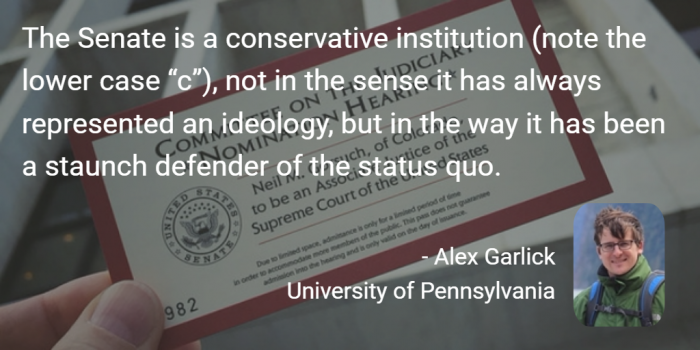 This week the US Senate has been considering the nomination of Judge Neil Gorsuch for the Supreme Court. Senate Democrats stand in staunch opposition to Gorsuch, meaning that Majority Leader, Mitch McConnell is now considering taking the “nuclear option” so that the nominee can be confirmed with 51 – rather than 60 – votes. Alex Garlick writes that history shows that the Senate’s rules have generally made it a defender of the status quo; changing those rules will make it more akin to the House of Representatives, with the influence of the minority party far reduced.
This week the US Senate has been considering the nomination of Judge Neil Gorsuch for the Supreme Court. Senate Democrats stand in staunch opposition to Gorsuch, meaning that Majority Leader, Mitch McConnell is now considering taking the “nuclear option” so that the nominee can be confirmed with 51 – rather than 60 – votes. Alex Garlick writes that history shows that the Senate’s rules have generally made it a defender of the status quo; changing those rules will make it more akin to the House of Representatives, with the influence of the minority party far reduced.
When the US Senate votes on Judge Neil Gorsuch’s confirmation for the Supreme Court next week, Senate Majority Leader Mitch McConnell and Minority Leader Chuck Schumer will find themselves in a delicate dance. Schumer’s Democrats have pledged that Gorsuch will need 60 votes for cloture (the ending of debate), leaving McConnell to mull taking the “nuclear option” and changing Senate rules on cloture votes as his predecessor Harry Reid did in 2013, lowering the necessary vote to break a filibuster to 51 instead of 60.
Rank and file partisans on both sides are adamant that their leadership take a hardline, but the leaders face a choice, between the short-term interests of their party and the long term rules of their institution.
In the short-term, the 51 vote threshold on nominations makes the Senate more like the House of Representatives, meaning it is more predictable and lessens the influence of any one member. For example, consider how the Senate confirmed President Trump’s cabinet over the past two months. Apart from Labor nominee Andy Puzder, whose nomination was withdrawn after personal accusations, the Senate has approved nominees who critics called unqualified, like Betsy DeVos for the Department of Education, and who described themselves as unqualified, like Ben Carson for the Department of Housing and Urban Development.
Compare this situation to President Barack Obama, who had a much stronger majority in the Senate and still lost significant nominees along the way including former Senator Tom Daschle for Health and Human Services and two nominees for the Department of Commerce. There is a good chance McConnell or other committee chairmen vetoed some of Trump’s nominees behind closed doors, but the threat of a filibuster made the Senate a stronger player in previous nomination cycles. In the 115th Congress, the Senate was a rubber stamp for the administration. This could be the case on Supreme Court nominations in the future, when the President has a majority.
But the more consequential disintegration of the minority party’s rights in the Senate can only be seen in the long term. The Senate is a conservative institution (note the lower case “c”), not in the sense it has always represented an ideology, but in the way it has been a staunch defender of the status quo.

Its conservative streak can be seen in the Senate’s role in the Civil Rights debate. After African- Americans proudly fought in World War II, there was a moment of racial liberalization. Jackie Robinson broke the color line in Major League Baseball in 1947, President Harry Truman integrated the military in 1948, and even the Supreme Court’s landmark Brown vs. Board of Education decision was issued in 1954. However, Congress did not pass its landmark Civil Rights legislation until the Voting Rights Act of 1965 — despite the wishes of Democratic and Republican presidents in the intervening years.
No one man did more to preserve that two-decade gap between WWII and the Voting Rights Act than Senator Richard Russell of Georgia. In Robert Caro’s exhaustive biography of Lyndon Johnson, Russell emerges as the “General” of the bloc of Senators from the South, whose ranks included a number of “Old Bulls” who chaired a number of influential committees where dozens of Civil Rights bills passed by the House of Representatives died or were watered down beyond recognition. The parties were not as well-sorted then, but Russell also wielded a powerful threat of filibuster from Southern Democrats and conservative Republicans. It was only when Johnson was president with massive influence over Congress that we saw genuine reform.
Despite the damage Russell wrought to the Civil Rights movement, he was widely considered a champion of the Senate, in part due to his leadership on Foreign Affairs, but also because he placed his institution first. Being the leverage point on the major issue of the day also gave each Senator, both in the majority and in the minority, key influence to trade on other projects; for example when Johnson was trying to pass the 1957 Civil Rights bill as majority leader, a number of Western Senators received support from the Southern bloc for their Hells Canyon dam project.
Legislative strategy often does not take such a long view into account. But McConnell would be wise to proceed with the conservative nature of his institution’s interests in mind, especially because that conservative streak has often been the bulwark against progress for the rights of women, minorities, immigrants or consumers.
This is not to say Democrats should want McConnell to employ the nuclear option either. Imagine the thought of Ted Cruz with a lifetime appointment. Or for Republicans, who are an election or two from the minority, consider what the hearings would be like if Elizabeth Warren were nominated for the Court without the backstop of a 60-vote threshold filibuster.
Over the long sweep of history, Senators who stand for their institution tend to be remembered fondly. Despite Richard Russell’s dark legacy on racial issues, there’s a reason the Senate bestowed what is essentially its highest honor on him by naming one of the three Senate Office Buildings after him. Like the institution itself, he was a conservative (lower-case “c”) for the ages.
Featured image: Admit One: Committee on the Judiciary Nomination Hearing of Neil M. Gorsuch, of Colorado, to be an Associate Justice of the Supreme Court of the United States by Lorie Shaull is licensed under CC BY SA 2.0.
Please read our comments policy before commenting.
Note: This article gives the views of the author, and not the position of USAPP – American Politics and Policy, nor the London School of Economics.
Shortened URL for this post: http://bit.ly/2o1NZ0Z
_________________________________
 Alex Garlick – University of Pennsylvania
Alex Garlick – University of Pennsylvania
Alex Garlick, Ph.D., is a Congressional Fellow for the American Political Science Association and an assistant professor of political science at The College of New Jersey, beginning in the fall of 2017. His website is www.alexgarlick.com












